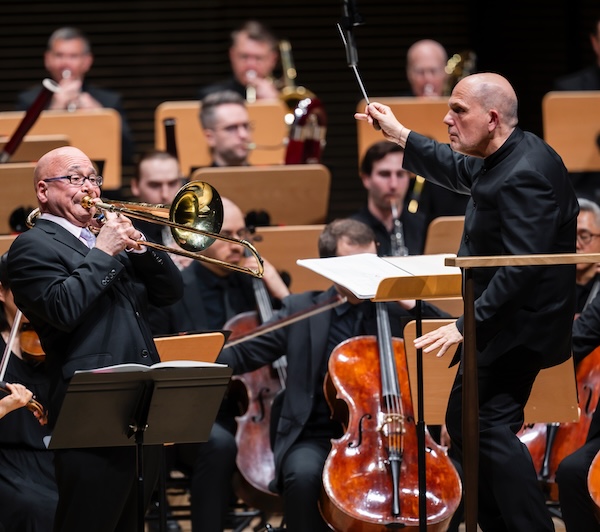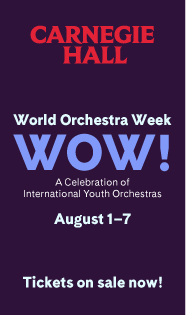Philharmonic program proves more than the sum of its parts

As Jaap van Zweden’s final concerts as music director of the New York Philharmonic roll by, the orchestra promotes them as “Celebrate Jaap!” And why not? He endured unpredictable and difficult circumstances, and one appreciates his focus and verve at the podium through transitional times.
And that’s what they’ve been. With the combination of pandemic shutdown, the David Geffen Hall renovation, and his own pending departure, the Dutch conductor’s influence has been necessarily elusive, his tenure becoming one long transition to a couple of years in the future, when Gustavo Dudamel is established as music director. More broadly, his era seems another part of the Philharmonic’s own unresolved transition from the end of the Bernstein era to some inchoate and seemingly unimagined resolution.
That’s the feeling of this week’s subscription program, conducted by van Zweden, that opened Thursday night in David Geffen Hall. There was the transition from the past to some point in the future, via two contemporary pieces (including a world premiere); and then what seemed like Van Zweden showing the audience what he cared about in his heart, via Mendelssohn’s Symphony No. 3, “Scottish.”
The world premiere was Joel Thompson’s three-movement orchestra piece, To See the Sky: an exegesis for orchestra. This was followed on the first half by Tan Dun’s recent Trombone Concerto: Three Muses in Video Game, played in its New York premiere by the Philharmonic’s excellent principal trombonist, Joseph Alessi.
Thompson has already made a name for himself as a choral and vocal composer, especially via his powerful Seven Last Words of the Unarmed and The Places We Leave, which the Philharmonic premiered in 2022. To See the Sky is in a sense music without words, full of lyrical phrases and with an unspoken but palpable narrative thrust. Both of these qualities were strong and beguiling in what sounded like a skillful and attentive performance from the orchestra.
There was also the sense of wordless music, though, in the way some stretches sounded like the accompaniment to a missing line. This was mainly the case in the first movement, where one was both impressed with how many inventive ideas Thompson tosses out and frustrated with how little he developed them. In a program note, he stated that he was uncertain about putting the rhythms of his Caribbean youth into orchestra music, “because then the question of genre arises,” but the orchestra had no problem with a lean, elegant backbeat rhythm in this movement. It was so strong and sounded so natural that one was disappointed that there was so little of it, as the music jumped from one thing to another.
The lovely middle movement had an inventive orchestration with trumpet and double-reeds that was one of the most attractive things one has heard in Geffen Hall this season. The final movement brought the narrative to a close in a classical sense, with a ramping up of energy and feeling through tribulation to success, and a satisfying coda with a welcome emphasis on his rhythmic ideas. The audience responded with a roar of enthusiasm.
Dun’s fine concerto was a strong contrast, using a small number of ideas and sticking to them both with patience and an awareness of their natural duration—everything felt deep and also had the Stravinskyian disinterest in extending itself for no purpose. Each movement is based around images of traditional Chinese instruments from ancient paintings, reimagined as video game music. This meant the music felt like it was introducing characters through instrumental qualities: the middle “Muse of Xiqin” had the uncanny feeling of the trombone playing strummed and picked string music (the xiqin is a fiddle).
This was all rather remarkable, full of one unexpected and charming moment after another. It was the musical equivalent of the “choose your fighter” moment in Mortal Kombat, a figure on display and poised for action. Alessi was terrific, playing with an easy command, not just relishing the clichéd trombone slides but producing a consistently beautiful sound, whether it was a mellow tone or one with a crackle and edge. This was the most unique music one has heard this season.
Van Zweden has been on a Mendelssohn kick this month, and a specifically Scottish one. Last week’s performance of the Hebrides Overture was technically skillful but superficial. Thursday night, the symphony was equally refined but this time full of thought, feeling, and purpose. Every moment there was a sense of direction, the kind of thing that results in music making that is so clear and meaningful that everything has great weight and clarity, no matter how light and fast the indications may be.
The strings had a sinewy shine and grain, and the pace and sense of form were excellent throughout. That meant that Van Zweden seemed to underplay the opening of the final movement, but that was merely setting up a gathering of energy and force to a superb resolution. This was one of the best performances one has heard from this conductor and orchestra together.
This program will be repeated 8 p.m. Saturday and 2 p.m. Sunday. nyphil.org
